Avoiding a future food crisis in Qatar
Qatar and the wider GCC region have very little arable land. Adding to this, a scarce supply of potable water, and a hot and harsh climate make the region one of the most dependent food importers in the world. In 2007 and early 2008, the prices of food commodities rose significantly. While wealthy nations such as Qatar were able to absorb price fluctuations to their nation’s food supply at a great cost, others were unable to do so. For states such as Egypt, the increasing food prices meant the eroding of purchasing power, which some commentators have pointed to being among the triggers for the Arab Spring. So what has Qatar been doing to guard against future food crises? Could Qatar ever run out of food?
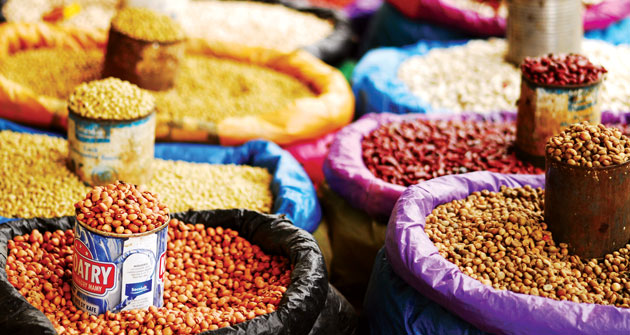
Here is an infographic of where Qatar currently sources its food from.
To understand food security, it is important to understand why the food prices went up. Zahra Babar, assistant director for research at the Center for International and Regional Studies (CIRS) at Georgetown University Qatar, tells The Edge that it depends on who you talk to. Her own opinion is that it was a convergence of issues, the imbalances in trade between importing and exporting countries, and the involvement of the financial industry in speculative investment in food commodities. Other more foreseeable problems included population growth, changes in consumption patterns and even the impact of climate change disrupting harvests (floods, droughts, etcetera).
Since the highs of 2008, the prices of food commodities have come down, but not below their previous levels, and higher prices are here to stay, says Babar. The large investments made by the financial industry not only creates price volatility but also structurally higher food prices.
In the aftermath of the food price crisis, governments, especially those within the Gulf Cooperation Council (GCC) rushed to enact policies that would deter any further price shocks and create long-term sustainable sources of food.
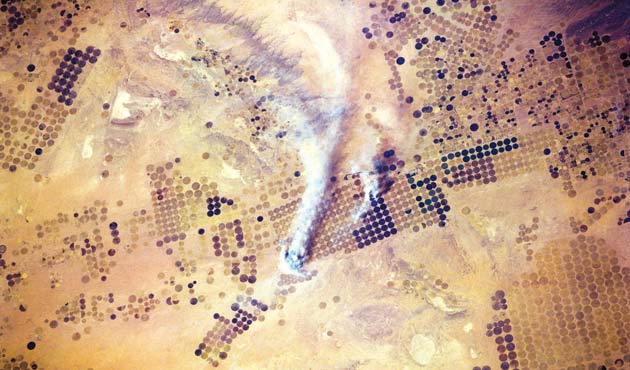
These large circular fields in the Saudi Arabian desert are a testament to the failed food self-sufficiency programme in the 1970s and 1980s. Its unsustainability has forced Saudi Arabia to wind down production in areas such as wheat and end production by 2016. Seen here are the once-green lands slowly being reclaimed by the desert. (Image Corbis).
However, Babar points out that there have been regional experiments in the past to deal with food security. An issue that has always been of concern was brought to the fore by the price shocks. Saudi Arabia in the 1970s and 1980s invested heavily in developing a food self-sufficieny programme – as much as 50 percent of their revenue from oil at the time, according to Dr. Eckart Woertz, who recently published a book entitled Oil for Food: The Global Food Crisis and the Middle East, which discusses what is now a failed domestic agricultural production programme. By the early 1980s, Saudi Arabia was the sixth largest global producer of wheat, “and this wasn’t actually a good thing at all,” explains Babar. The Saudi programme had reduced its import dependency but this came at a great harm to its environment.
Rolling back these programmes is usually very difficult, adds Babar, since a large segment of the population who are engaged in agriculture have a vested interest in their continuation. The Saudi government, since 2008 has been steadily reducing wheat purchases from local farmers, and all domestic production will come to an end by 2016. “Qatar on the other hand, has decided to take a more strategic and multi-faceted approach,” says Babar.
A food security programme
The Qatar National Food Security Programme (QNFSP) was set up in 2008 and formally instituted by Emiri Decree No. 45 in 2011. The QNFSP today has two mandates, explains Jonathan E. Smith, the senior advisor to the chairman of QNFSP, Fahad bin Mohammed Al Attiya. One, he says is to develop a strategic master plan for addressing food security both in the short-term by fixing critical problems, and in the long-term to enact a plan that is resilient to the various challenges. The second key part is to aid the overall sustainable growth of Qatar through the implementation of that master plan.

Jonathan E. Smith, the senior advisor to the chairman of the Qatar National Food Security Programme says, having sovereign ownership of the land does not equate food security if you cannot get those resources back to the market.
Depending on the year, almost 90 percent of Qatar’s food needs come from imports. Therefore, the price shocks like those experienced in 2007 and 2008 are especially painful for countries such as Qatar, explains Smith. In addition to price volatility, Qatar’s geographical location further exacerbates the issue. According to Smith, 90 percent of imports come through just two points, either via sea through the Strait of Hormuz or the one major land route across Saudi. Therefore, any shifts in food prices around the world have an amplified effect in Qatar. Since 2011, the QNFSP has been working towards a comprehensive national plan, which he says will be presented to HH the Emir Sheikh Tamim bin Hamad Al Thani as a recommendation this summer.
The great land grab
In the aftermath of the food price crisis, numerous cash strapped GCC countries announced agro-investments in far off countries – many of which were food insecure themselves - in the hopes of securing steady food supplies for their nations. These land purchases brought criticism on the countries and their investments were pejoratively labeled ‘land grabs’. Babar says there is very little data out there on the subject of agricultural investments, and especially those undertaken by the GCC. This makes it very difficult to determine where they are going wrong, and whether they are interacting negatively with the local environment. According to a study by the CIRS, Qatar has made several investments in countries that include Cambodia, Sudan, Turkey, Brazil, Vietnam, Pakistan, India, Ghana, Indonesia, The Philippines and Australia, some of which have come through the agricultural arm of its active sovereign wealth fund, Hassad Food.
Overseas land investments have become highly politicised, and skeptics have been severely critical, dubbing these investments as neo-colonial enterprises. Previous experiences have shown that these kinds of investments can end up stressing food security or even the economic security of the host country, creating even worse developmental trajectories, explains Babar.
Advocates for these foreign investments, however, claim it as the perfect vehicle for energising lethargic agricultural sectors in parts of Africa and South and South-East Asia, which have suffered from financial neglect and otherwise, says Babar. In some parts of sub-Saharan Africa the yield per hectare is very low and with investment from say the GCC, you could see an abundant increase in production, adds Babar. For example, the cereal yield per hectare between 2008 and 2012 in India was 2883 kilograms, while the same area in Spain produced around 3600 kilograms, according to World Bank figures.
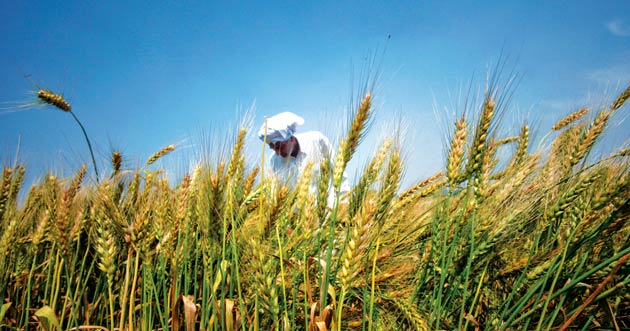
Any shifts in food prices around the world have an amplified effect in Qatar.. (Image Reuters / Arabian Eye)
The fact remains that across the board self-sufficiency – that is to say growing locally all of Qatar’s food consumption needs – is not something Qatar can realistically attain. The country can probably increase this in certain niche sectors such as fruit and vegetables, dairy and maybe poultry, says Babar. “Self-sufficiency in grains is not possible,” she furthers. In fact, Hassad Food invests abroad in some of these very key areas. Most recently at a media roundtable, the chairman of Hassad Food, Nasser Al Hajri, announced the purchase of a majority stake in Bush Foods in India which owns three rice brands.
It is important that best practices are implemented in agro-investments, says Babar, and a clear understanding of how these investments can be made in a way that is pro-poor, sustainable and does not destabilise or marginalise local farming communities.
Babar and other experts tell The Edge, that from their discussions with Hassad Food, the organisation has the correct model in terms of social equity, social responsibility and environmental stewardess. Responsible investments anywhere around the world are an important part of Qatar’s food security portfolio, says Smith. Having sovereign ownership of the land does not equate to food security, because if you cannot get those resources back to the market in a way that builds relationships with the host country, you have not increased your food security at all, he points out. Additionally, as an arm of Qatar’s sovereign wealth fund, Hassad Food is primarily a profit-generating entity, with Al Hajri stating numerous times that product would be sold at a price comparable to the global food market.
Water, energy and food nexus
Part of what the QNFSP has been doing is looking at food security projects from around the world to see where they have succeeded or failed. “One of the critical learnings is that you need to be very mindful that when addressing domestic production, you must be sensitive that you are not increasing your water insecurity by growing food,” explains Smith. Indeed, countries such as Saudi Arabia learnt this lesson the hard way.
When water insecure or water stressed nations export foods crops, what they are essentially doing is also trading away ‘virtual water,’ that is all the water that went into growing the final product. Nations that are water insecure or water stressed should not get into the business of exporting food crops, furthers Smith, and Babar agrees saying it is of paramount importance that nations strategise away from this practice.
Dr. Rabi Mohtar, who was recently appointed as the executive director for strategic projects, research and development at Qatar Foundation, explains that food should not be looked at as a challenge on its own but rather in conjunction with two other critical resources that have significant impacts on one another, water and energy.
The water, energy and food nexus has become somewhat of a buzzword today, but it is something Dr. Mohtar has been debating from an academic standpoint for more than 15 years now. “At the heart of the nexus is this interconnectedness between water, energy and food,” he says. As part of the QNFSP’s mandate to develop a sustainable growth plan, the need to adopt this concept is vital.
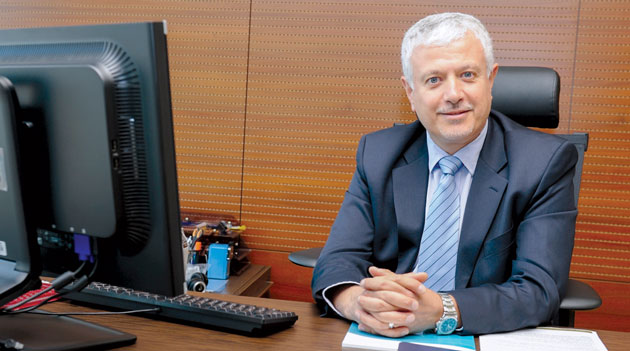
Dr. Rabi Mohtar, the executive director for strategic projects, research and development at Qatar Foundation, explains that food should not be looked at as a problem on its own but rather in conjunction with two other critical resources: water and energy.
A relevant local example is the push for solar energy that could be used to power local food production. Traditional solar energy technologies developed outside the Gulf States require cooling, and have high water footprint. So while it could be a useful solution in terms of reducing dependency on natural gas and reduce emissions, Qatar cannot afford a system with low carbon production and a high water footprint, explains Dr. Mohtar, adding that Nexus friendly technology has to be low-carbon, low-cost but also low water footprint.
According to Dr. Mohtar, 72 percent to 75 percent of water is used by farmers to produce food, and 30 percent goes to energy production. “This means you don’t have a water management problem, you have to manage the stakeholders of the water to help you. And that’s when the idea of the nexus came to me. To provide the solutions for the increasing demand in water, you have to know who the people that are the most in need of that water. In this case it is the food and the energy sector,” he says.
But this sort of thinking is not pervasive in most policy-making circles. Most recently at an United Nations General Assembly speech in New York, Dr. Mohtar faced some criticism for saying that no food should go towards biofuels. However, it is his nexus thinking that has influenced this decision, “I was not specifically saying no to biofuel. I am for biofuel but biofuel that comes from waste rather than food. You cannot afford to take the corn out of the food supply cycle and push it into the energy cycle.”
However, Dr. Mohtar feels that the vision here in Qatar is a correct one that is focused on long-term sustainability. “The vision that the chairman of QNFSP has had in the nexus is pioneering, and sets Qatar at the forefront of sustainable food security,” he says. “I was very impressed by the vision, he was coming from a national policy angle, while I approached the nexus from research and development. I believe the chances for Qatar to succeed are very high. Because they realise that sustainability is the only way to move forward.”
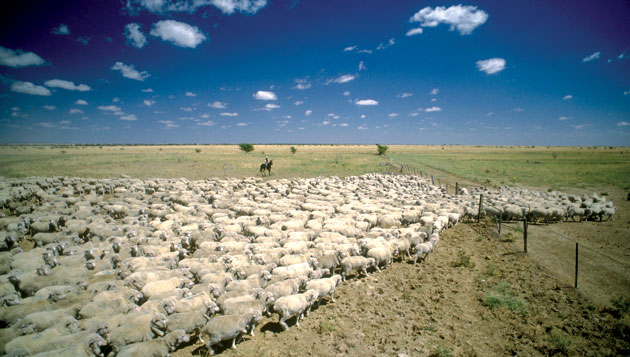
Nasser Al Hajri, chairman of Hassad Food recently stated that Hassad Food have the capacity of producing 100,000 sheep from their subsidiary farms in Australia. (Image Corbis)
Looking at global food stress today, there are seven billion people on the planet, with another two billion expected to join the population by the end of the century. That in itself says there is going to be competition for food and water resources, says Smith. But exacerbating the problem will be the fact that most of this new population will land in areas that are food insecure, water insecure and in some critical cases both. “We are realising this is one of the greatest challenges of the next 50 years, and one that needs to be resolved in the next 10 years.”
The key to this is to refine technology in agriculture to suit the needs of water stressed areas. “We have to get past the innovations of the 1960s and the 1970s for food,” says Smith, where the thinking was to find places that looked a lot like the northern hemisphere and trying to maximise production.
A technological revolution
Instead, explains Smith what needs to be done is to look at technologies that will help produce, process and manage food by using less water. The national master plan that will be presented to HH the Emir this summer will contain a recommendation for an agro-industrial park, adds Smith.
What the QNFSP will be recommending will be a market participation model much like the Qatar Science and Technology Park, a zone for public and private participation in not only developing the food market, but also the technology market. “We think it is important to make Qatar a magnet for those who are working on solar technologies, or those who are working on genetic technologies that help us bring safer food and food inspection technologies to the marketplace,” Smith furthers.
The future of food
There is fierce competition in the food market today, and it is set to get only more challenging in the future. 80 percent of the planet lives under some kind of national food security plan, says Smith. This means other countries are already strategically looking into the marketplace, and this makes it important, from a competitive standpoint not to be left out.
This is the next big thing, claims Smith. As climates change, populations grow, and water and land resources start shifting, they will have a profound effect on food availability in the world. “What the energy boom was for the past century, this is for the next century, and it is not all bad. Qatar has, in the past 10 years, shown how strength from an energy standpoint has helped them be a better peacemaker in the world. Strength from a food and water security standpoint in the next century will help nations be better peacemakers in the world.”
Like this story? Share it.





